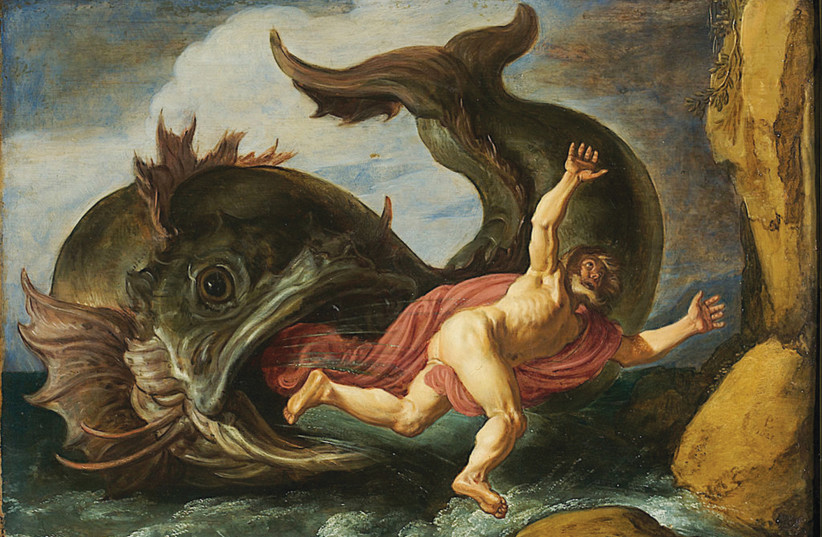Yom Kippur, the Day of Atonement, is the day on which the Jewish nation unites in fasting and prayer. This year, Yom Kippur falls on Tuesday night and ends the following night. We spend the day in introspection and soul-searching, examining our habits. It is a day on which we stand before God in prayer as the new year unfolds, trying to think how we can be better people this year. The name of the day does not come from what we do on it but rather from God’s reaction to our actions. On this day, God atones and forgives us for our sins and accepts our process of repentance.
During the Mincha prayers of Yom Kippur, we read the Book of Jonah. This short book tells the story of Jonah, a man who lived in biblical times and was given the prophetic mission to go to the city of Nineveh, the capital of the Assyrian empire (today near Mosul, Iraq), and declare that God is calling upon its inhabitants to repent, and if they do not, the city will be destroyed in forty days.
Surprisingly, Jonah refuses to carry out the mission. He decides to escape and goes to Jaffa, Israel’s ancient port city, where he boards a ship sailing for Tarshish (a trade city in Anatolia). While at sea, a storm hits and the waves threaten to sink the ship. The ship’s sailors, who were idol worshipers, offered sacrifices to their gods in vain to be saved from the storm. At a certain stage, Jonah tells them his story, and they understand that the storm had come upon them because Jonah had fled from God. They throw him overboard, where a huge fish swallows him. He remains there for three days, during which he movingly appeals to God.
Jonah’s prayers are heard, and the fish discharges him on land. Jonah again is given the mission to go to Nineveh and warn its inhabitants. This time, he obeys. He goes to Nineveh, warns the people to repent, and indeed, they heed the warnings and repent. The story ends with Jonah sinking into depression. He is angry at God for accepting the repentance of Nineveh’s inhabitants. God explains to him how important they are in His eyes and why, therefore, He does not want to punish them but would rather they repair their ways.

An incredible story on the value of man and how God will never give up on you
This incredible story corresponds with the words of the prophets calling for repair because of the value of man. So, for example, God instructs Ezekiel the prophet to tell the Jewish nation:
“Cast away from yourselves all your transgressions whereby you have transgressed, and make yourselves a new heart and a new spirit… For I do not desire the death of him who dies…” (Ezekiel 18:31-32)
“Cast away from yourselves all your transgressions whereby you have transgressed, and make yourselves a new heart and a new spirit… For I do not desire the death of him who dies…”
Ezekiel 18:31-32
Jonah’s prayer from the depths of the sea is no less interesting:
“And You cast me into the deep in the heart of the seas, and a river surrounded me; all Your breakers and Your waves passed over me.
“And I said, ‘I have been driven away from before Your eyes,’ Indeed, I will continue to gaze upon Your Holy Temple…
“When my soul grew faint upon me, I remembered the Lord: and my prayer came to You to Your Holy Temple.” (Jonah 2:4-8)
In great despair, Jonah finally understood his mistake. He tried to escape from God, but he discovered that this was impossible. While thrashing among the waves, he realizes that his glance has to continue to be toward God, “upon Your Holy Temple.”
God does not give up on people. That is one side of human existence. But the second side is no less important. Man cannot escape responsibility and the need to stand before God and anticipate His salvation.
The Book of Jonah is read on Yom Kippur because it strongly expresses these two principles of human existence that come up during Yom Kippur when we stand before God with integrity and courage, conducting our soul-searching. It does not matter what you did until now, how you sinned or how you behaved – God does not give up on you. Ever. Human existence is a riddle. You and I are called upon to solve it. The answer is in taking responsibility, heeding the call, being prepared to repair our ways – this is our answer, our teshuva. ■
The writer is rabbi of the Western Wall and Holy Sites.
